- Home
- Lise McClendon
Nordic Nights (The Alix Thorssen Mysteries)
Nordic Nights (The Alix Thorssen Mysteries) Read online
Nordic Nights
AN ALIX THORSSEN MYSTERY
by
Lise McClendon
To my mother and father with love
Copyright © 1999 by Lise McClendon
All rights reserved. No part of this book may be reproduced or transmitted in any form or by any means, electronic or mechanical, including photocopying, recording, or by any information storage and retrieval system, without permission in writing from the Publisher.
All the characters and events portrayed in this work are fictitious.
This edition published in 2010 by Thalia Press
First published in the United States of America in 1999 by Walker Publishing Company, Inc.
Published simultaneously in Canada by Fitzhenry and Whiteside Markham, Ontario L3R 4T8
Nordic Nights
by Lise McClendon
In this fateful hour,
I call upon all Heaven with its power
And the sun with its brightness
And the snow with its whiteness
And the fire with all the strength it hath
And the lightning with its rapid wrath
And the winds with their swiftness along the path
And the sea with its deepness
And the rocks with their steepness
And the earth with its starkness.
All these I place,
By Heaven’s almighty help and grace,
Between myself and the powers of darkness.
—Traditional rune
Chapter 1
Wealth causes strife among kinsmen.
The wolf lurks in the forest.
Fine white flakes sifted across the sallow slash of the spotlight in the town square. Callous gift of a coldhearted Mother Earth: a hard blessing of snow that fell and fell and fell. The sculptures carved of brittle ice looked small, insignificant, in the wavering, jaundiced holes in the night. Above it all the clouds hung like dirty laundry.
Artie Wacker poured coffee. It was obscenely late, or early. The town slept. We sat in the Second Sun, my Jackson gallery, with the track lights off, in our own pools of weak light, waiting for word from the police station. Thinking, I should be there, I got up to pace. I thought about the postcard I got from Erik yesterday, the one with the joke about the end of his marriage: Only the Ice Man has his pick. Prophetic now. All is prophetic in hindsight. I picked up the telephone and dialed Erik’s number in Tucson. It rang six times before he picked it up, sleepy.
“It’s Alix.”
“Hey, little sister.” A click, the light. “It’s three in the morning.”
“I know. Listen, Hank’s been arrested.”
“Who?”
“Hank Helgeson, our mother’s husband? Chubby little ornery cuss, more Swedish than meatballs?”
“Oh, Hank. The meatball. Did he leave his socks on the floor or something?”
“Mom didn’t arrest him, Erik. The cops did. For murder. Can you come up here, by any chance?”
“Whoa, whoa, back up. Murder?”
“The weird thing is he really liked this guy. A Norwegian artist, same kind of twisted Norsky pride.”
“A real Norwegian?”
“From Norway, just got here today, and tonight he’s dead. The Chamber of Commerce is going to love this.”
“Was he in a rental car? Never mind. Why was Hank arrested for it?”
“Something about him being there in the room with the body. Can you come? I don’t think I can handle Mom by myself.”
“Who are you kidding? You’re the youngest, her fair-haired girl. Ever since I called her a freeze-dried pickle at the reunion—”
“You did have too much to drink.”
“She hasn’t spoken to me since. You think she’s going to want to see me in her hour of need? After I sang that little ditty about Hank—A Norse is a Norse, of course, of course—”
“She’s going to be humiliated.”
“She married the meatball.”
“Oh, Erik. Come for me, then.”
He sighed, long and hard. “Tomorrow the Over-Eighty Tournament starts with a bang. I’ve got a staff of a hundred for these geezers, with that many golf carts. I can’t, X. But let me know what happens. Like if Mom gets her revenge. That was always fun.”
“Hank was supposed to show his Viking longboat in the parade tomorrow—tonight—for the winter festival. Nordic Nights.”
“The thing he’s been building in the garage for the last five years?”
“His pride and joy.”
Erik sighed again. “How are you doing?”
“Business is great. Couldn’t be better. Christmas was fabulous.”
“No, you yourself. Personally.”
“Fine.”
“Still the stoic Norsky. I thought that business last summer might have changed you.”
“It did, Erik.”
“I know, kiddo.”
“It meant a lot to me that you came up then. I’ll get through this. I will.”
“I always said you had bigger balls than Odin.”
“Thanks, I guess.”
“Give the meatball my best.”
Artie Wacker and I finally bundled up and walked the five blocks to the police station. The night sky huddled close overhead, unwilling to let us forget the grip winter had on us, body and soul. My slouch hat wasn’t much protection from the snow and biting cold, but Erik’s faded red down jacket, dotted with duct tape to keep in wayward feathers, still held winter at bay. Artie hailed from Alabama. He was no doubt regretting his decision to take a semester off from LSU and come north. His teeth took up a singsong chatter before we got to the corner. At least he had a butternut-brown goatee to keep his chin warm.
The town hall squatted, lonely and dark with its fancy cedar siding and moss rock, its modern clock tower announcing that we should be in bed. Picking our way through the drifts, we found the back door. I had to knock loudly, twice. A policeman opened the door and recognized me.
“What’s going on?” I asked, searching the cop’s chest for his name tag. He wasn’t wearing his uniform. Out of luck. And not for the first time tonight.
“Your mother’s in there with Mr. Helgeson and Roscoe Penn.”
“Roscoe Penn? The lawyer?” Artie grabbed my sleeve to peek around me, struggling for a view of the lawyer through the blinds in the hallway window. “I saw him on Geraldo last summer. He’s really something, isn’t he?”
Out of my foggy brain came the policeman’s name, Elmer: tall, fifty-five, going to fat. He leaned into me and whispered in my ear, “Who’s the elf?”
“Artie Wacker, works for me at the gallery. Artie, meet Elmer.”
They shook hands. Artie wasn’t too interested in the policeman. He squatted down to look under the blinds.
“Hank wanted Roscoe,” I said, still sorting it in my own mind.
“Damn fine representative of the legal profession,” Elmer said. His gray mustache twitched.
“And to think he could have had Uncle Lars’s stepson, Eugene. Or a lawyer who wears three-piece suits. Did you see Roscoe on Geraldo? The Indian blanket around his shoulders and a coonskin cap? He looked like Davy Crockett rolling out of the sack.”
“He’s gone to the cowboy hat tonight,” Elmer said. “With a big feather, though.”
“Is Charlie Frye in there?” I asked. Elmer nodded.
“Here comes Roscoe Penn!” Artie said in an excited whisper, standing up.
The door opened, and the lawyer stepped through. Smiling, his gray cowboy hat sitting back on his head, Penn cut a grand figure through the cold, bland corridors of linoleum and fluorescents with his taupe gabar
dine cowboy-cut suit and shiny black boots. He looked Artie, Elmer, and me in the eye like he was running for office, then turned back to take my mother’s arm, gentleman-like.
Una smoothed her indigo velveteen tunic, her hand shaking. Her short cap of gray-blond hair hung neatly over her tired blue eyes. Roscoe dwarfed her with his height. She looked up from listening to his whispering and saw me. She reached out her hand and squeezed mine.
“You really should be in bed. It’s late, isn’t it?” She looked at her watch. “Dear me.”
“I couldn’t sleep, Mom.” I peered around them. “Where is he?”
Penn rubbed his square jaw. His face had the rugged appeal of the Marlboro Man, whom he had represented once: a match made in litigious heaven. The feather in his hat was striped and extravagant, like the man himself. He needed a shave (a little salt-and-pepper there), but who didn’t at four a.m.? “We can’t get a hearing on the bail until morning, and the authorities, in all their wisdom, think it’s best to keep him here.” Penn gave Elmer a dismissive look. “This will all be over in the morning. It’s a simple mistake.”
“They’re keeping him overnight?” I asked. Una nodded, flashing her expressionless eyes at me, then Penn.
“Believe me, Mrs. Helgeson, honey,” Penn turned to her and said, “I’m going to straighten all this out in the morning. He’ll get a wicked night’s sleep.” He glanced at his watch and raised his eyebrows: not much night left. “Then ol’ Roscoe here will get Judge Foss to send him home in the morning.” He straightened his broad shoulders, to reassure us of his manly confidence, then declared: “There is nothing worse than a small man with authority. Or a woman.”
Charlie Frye came out of the room on cue, holding Hank by the arm, wearing his all-weather trademark wrinkled gray suit, his crew cut fresh above sagging eyes. Chief of Police Charlie Frye’s dislike of me had solidified last summer, and the fact that I put a slew of his arson cases to bed had done nothing to affect his attitude. I made work for him, I have an intrinsic disrespect for authority, and I made him look like the political-appointee-with-shit-for-brains that he was. Come to think of it, I might dislike me too if I were Charlie.
This was my first look at Hank since his arrest, since he left for a nightcap with Glasius Dokken and Una earlier this evening. Glasius, who was now dead. What had they done after I left the gallery? Hank, my stepfather, looked terrible. His ragg wool sweater had crept over his large, round belly to reveal the unbuttoned blue oxford cloth shirt underneath and curly gray hairs, much more than grew on his head. At sixty-four he was three years younger than Una—and nearly bald. His gold wire-rimmed glasses, framing small gray eyes, were bent, sitting askew on his bulbous nose. His mouth hung open, and spittle clung to the corners. His wrists were in handcuffs. He looked so different from our tall, lanky father, whose flaxen hair and James Dean coolness was seared into my memory. My brother’s description of Hank as a meatball sprang to mind.
“Did you hear that, honey?” Una said to him. “Mr. Penn says we’ll have you out in the morning. Do you want me to bring over your Metamucil?”
Charlie Frye and Elmer exchanged looks. I stepped up: “Mom, I don’t think Hank’s going to need that tonight.” My mother blinked viciously. “He’ll be out before you know it. And you have toothbrushes and stuff, don’t you?”
“Come on now, Helgeson,” Charlie barked with excess authority, ignoring me. “Elmer, take him to the lockup.”
The policeman was gentle with Hank, guiding him, shuffling, past his wife and lawyer, down a dim corridor. Elmer flipped on a few switches as he went. We watched from the hallway for a moment, then Una turned away, a flicker of pain across her still-blond eyebrows. She lifted her apple-red chin, chapped by the winter wind, and turned to the lawyer.
“Eight o’clock, did you say, Mr. Penn?”
“Nine will be fine, Mrs. Helgeson.” He helped her slip on the navy pea coat, putting his arm around her shoulders as we walked to the door. Penn, ever the gentleman, offered us a ride in his Cadillac.
We climbed into the car, a turquoise cruiser from the early seventies sporting longhorns on the hood like a cartoon villain’s sinister mustache. The crushed velvet backseat swallowed us up, bringing back memories of the Thorssen-mobile, a ‘62 Plymouth station wagon. I could barely see out the windows. Artie pulled his feet up under him. Penn drove carefully on the snowy streets, back fins swinging around each corner. Having a car like this in Jackson Hole was even more deranged and impractical than owning, as I did, a ‘67 Saab with bad tire karma and a squirrel-powered engine. I had to admire him for it.
He was giving us a little legal pep talk, telling us about his clout, dropping names of judges, politicians, backstage with Call-Me-Phil Donahue in the early days, later with Oprah. My mother was eating it up, hanging on every word.
Penn took a breath. I asked, “What exactly do they have on Mr. Helgeson, evidence-wise?”
“Squat, Miss Thorssen. They don’t have jack. There’s nothing to link Mr. Helgeson to the ice pick in the deceased. He says he didn’t even touch it when he found the body. It’s another case of Big Fucker Charlie Frye—pardon me, Mrs. Helgeson— thinking he can solve a case because somebody’s handy to pin it on. He doesn’t have anything, he doesn’t know anything. It’ll all be over in the morning.”
Una sighed raggedly in the front seat. I stared at the dark, snowswept boardwalks of Jackson, Wyoming, through the crystallized glass. Unrelenting winter: a good night for Skadi, Viking goddess of snow. If the Thorssens of a millennium ago had sailed the fjords, tracked the barren snowfields on two spruce planks, and sent their children far west across endless seas to distant, unknowable dangers, what did that make me? A bloodthirsty adventurer, a foolhardy seeker of knowledge, a risk taker? I didn’t know. I didn’t know if I ever would know. Maybe the journey to find out who you were was what spurred on the Vikings—and me.
Glasius Dokken. It wouldn’t be over for him in the morning. He would still be dead. I shut my sandpapered eyes. Shit, why did I bring him here? Why couldn’t I have let him have his flyover, go directly from Seattle to Minneapolis without passing Go, without collecting his two-hundred-dollar ice pick between the ribs? Why couldn’t I have been satisfied with a simple ice sculpture contest? Why did I always complicate things to the nth degree, as my ersatz boyfriend Carl Mendez would say? Tangle, tangle, endless thread, Find the finish then you’re dead.
A kindred spirit, Glasius. His moody, complicated murals of Viking legends were hanging at the gallery. Yesterday morning there was an air of excitement in Jackson. The first day of Nordic Nights. Not an average day in the gallery, not at all.
But I hadn’t thought it would end in murder.
Chapter 2
Need constricts the heart, but it often serves as a help and salvation
to the sons of man, if they attend to it in time.
“Alix Thorssen.” He let the two words trill across his tongue, thick with the flavors of Norway. “You know that is not a proper Norwegian name.”
Glasius Dokken had already explained to me that the government in Norway won’t let you name your baby just anything, it must be a proper Norwegian name. Parents who try to be original, opting for Butch or Susie or Latoya, are ordered to rename the baby at once. Alix is not acceptable for a girl. “Alix Thorssen,” he muttered again under his breath, shaking his head sadly, feeling so very sorry for me. Poor, poor child with an improper name.
“Sigrid. Katja. Sonja maybe,” he mumbled off and on all day, squinting at me. “Ve vill tink of a proper Norwegian name for you.” It sounded more like Norveejun when he said it, a little like Lawrence Welk. A-vun and a-two. He had a habit of tapping his finger against the side of his nose, to think. “Agneta? Agna for short? How about Steine?” He floated many name trial balloons, all of which I shot down. I was rather partial to Alix after all these years, Norveejun or not.
A thousand years ago the Norsemen made a culture of winter. They tamed it with their ferocious tempers,
their adventurous hearts. But this particular Norseman wasn’t brawny or bold or even very enamored of the cold that we had in abundance. He did think the mountains, soaring like adolescent hormones from the sagebrush plain, were magnificent. I invited him to come back and paint them, to stay with me or Luca or one of my artist friends, to capture the grandness of the jagged rocky points we call the Tetons. He captured so much history in his murals, I had no doubt his Teton paintings would show a new facet in an oft-recorded scene.
“I will paint those mountains,” he said. “Just for you, Alix Thorssen. For the Second Sun Gallery, where you shine as bright as the midnight sun. To show ever’body no one knows the snow and mountains like a Norwegian. No one can feel the many colors of snow like a Norwegian.”
Glasius Dokken, very proper, was an art professor at the University of Scandinavia in Oslo, painter of Viking murals, chronicler of myths. His hair was like snow, a white fluff on the peak of his head, a sprinkling of dandruff on his lower slopes. With rounded shoulders and long, artistic fingers, he viewed the world from behind smeared steel-rimmed glasses. His eyes were as bottomless as the sky, his nose beaky and thin, his bottom lip full over a double chin. He walked slowly, examining everything with his eyes, with a light brush of his fingers, a gentleness of subtlety and ambiguity. Except when it came to Things Norwegian. Like the running gag about my name, which was much more serious to him than me, Glasius Dokken believed that some things were sacred.
It was, that January, a dangerous belief.
The wind blew steadily, full of ice, the day Glasius Dokken flew into Jackson Hole. The airport sits in the eastern shadow of the Grand Teton, on a flat bluff above the Snake River and the cluster of dramatic rocky peaks. A Frenchman’s wet dream, the Tetons: cross my heart. The American Airlines jet came in sleek and smooth through hard, cloudless skies, carrying the painter and his crates.
The Norwegian artist was on a nationwide tour with his Viking murals. He had squeezed the Nordic Nights festival in between a showing at the Scandinavian Museum in Seattle and a special event at the Walker in Minneapolis. I felt lucky to get a man of his caliber, a famous artist from the homeland, into the Second Sun Gallery.

 Blame it on Paris (Bennett Sisters Mysteries Book 7)
Blame it on Paris (Bennett Sisters Mysteries Book 7)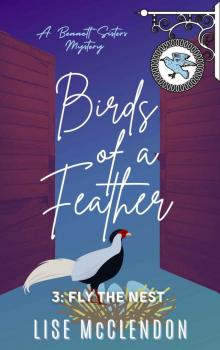 Birds of a Feather: 3: Fly the Nest (Bennett Sisters Mysteries Book 16)
Birds of a Feather: 3: Fly the Nest (Bennett Sisters Mysteries Book 16) Blame it on Paris
Blame it on Paris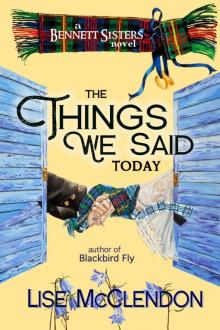 The Things We Said Today
The Things We Said Today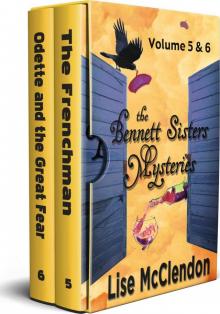 Bennett Sisters Mysteries Volume 5 & 6
Bennett Sisters Mysteries Volume 5 & 6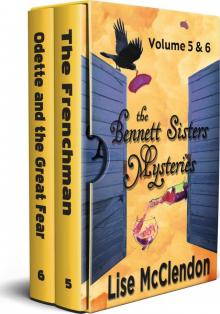 Bennett Sisters Mysteries Box Set 2
Bennett Sisters Mysteries Box Set 2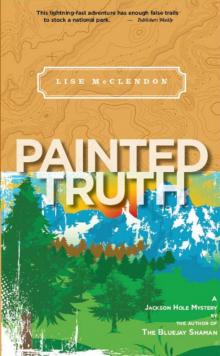 Painted Truth
Painted Truth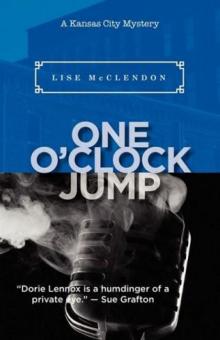 One O'Clock Jump
One O'Clock Jump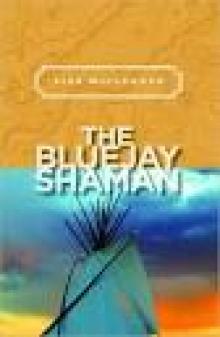 The Bluejay Shaman (Alix Thorssen Mystery Series)
The Bluejay Shaman (Alix Thorssen Mystery Series) Swing Town Mysteries Dorie Lennox Box Set
Swing Town Mysteries Dorie Lennox Box Set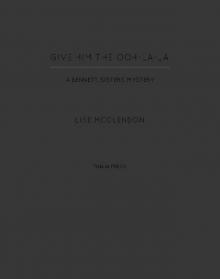 Give Him the Ooh-la-la
Give Him the Ooh-la-la Blackbird Fly
Blackbird Fly All Your Pretty Dreams
All Your Pretty Dreams Nordic Nights (The Alix Thorssen Mysteries)
Nordic Nights (The Alix Thorssen Mysteries)